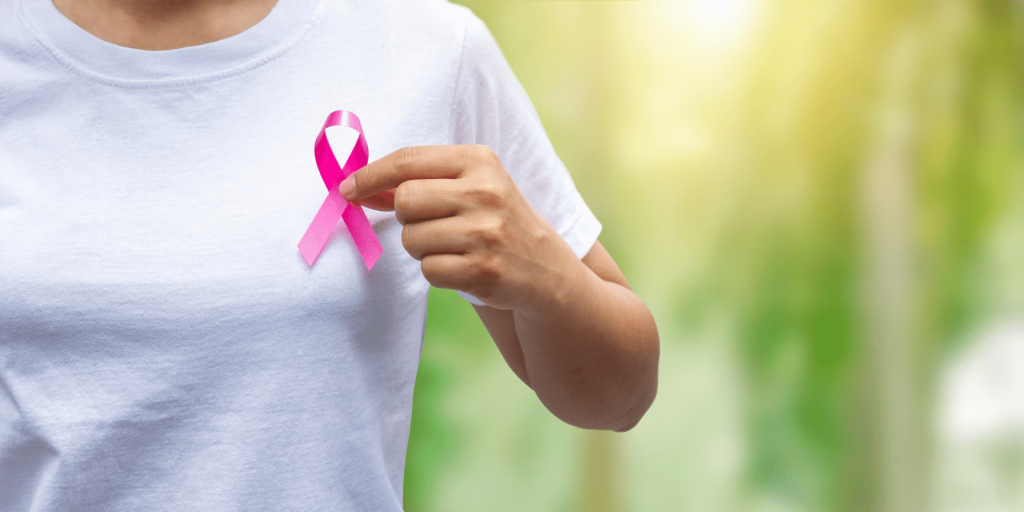6 products that will reduce your risk of cancer

The so-called Pink October, or Breast Cancer Awareness Month, is currently underway to draw special attention to the prevention of the disease. We, in turn, would like to draw attention to the fact that diet, can have an impact on reducing the risk of cancer. Find out about the products that are worth incorporating into your daily diet, as well as those that can increase your likelihood of developing cancer.
For several years now, October has been the month when we hear a lot about breast cancer prevention. All because of European Breast Cancer Day, which is celebrated on 15 October. According to the World Health Organisation, 2.3 million women will be diagnosed with breast cancer in 2020 and there will be 685,000 deaths. This is why education about its prevention is so important. From this article, you will find out if there is an anti-cancer diet and learn about the products that can help reduce the risk of not only breast cancer but also other cancers.
Anti-cancer diet – fact or myth?
It should be made clear that there is no diet that can be called anti-cancer and that offers a guarantee that you will not get cancer. If you come across information about such miracle diets, know that it is a myth. Paradoxically, an anti-cancer diet is actually a balanced healthy diet, based on the principles of the Pyramid of Healthy Eating and Lifestyle. However, you can make sure to include products that contain biologically active compounds with strong antioxidant or anti-inflammatory effects. Such products can be found in every shop and can easily be incorporated into your daily diet.
6 products that will reduce the risk of cancer
1. Garlic
Allicin (diallyl thiosulfinate) is the best-known biologically active ingredient in freshly crushed garlic extract. Studies show that allicin inhibits the growth of cancer cells and also contributes to apoptosis, or their self-destruction.
2. Green tea
The biologically active compounds in green tea include epicatechin (EC), epigallocatechin (EGC), epicatechin gallate (ECG) and epigallocatechin gallate (EGCG). They are powerful antioxidants and inhibit the proliferation of free radicals, thus protecting the body against the development of chronic diseases and cancer.
3. Olive oil
A meta-analysis of studies on the effects of olive oil consumption on the development of cancers, particularly breast and gastrointestinal cancers, showed that a high intake of unprocessed olive oil reduces the risk of cancer. However, it is still unclear whether the monounsaturated fatty acids or the antioxidant components it contains are responsible for its beneficial effects.
4. Cruciferous vegetables
Cruciferous or brassica vegetables, among them cauliflower, cabbage and broccoli, as well as many others; contain glucosinolates, which the body can convert into isothiocyanates. These compounds show strong anti-cancer properties and should also be on our plates as often as possible.
5. Fermented dairy products
A 2019 meta-analysis shows that the consumption of fermented dairy products (such as natural yogurt and kefir, for example) contributes to a reduction in cancer risk. This is because of the nutrient content and the probiotic bacteria cultures. It is worth remembering that these products should not contain sugar and, most importantly, milk powder.
6. Wholegrain products
Whole grain products are rich in nutrients, as well as fiber. A study of 250 women suggests that consuming whole-grain products more than seven times a week helps to reduce the risk of developing breast cancer. Another meta-analysis also supports recommendations related to increasing their intake in the daily diet. It showed that consumption of whole grain products had an impact on reducing the risk of other cancers as well. However, it is important to be conscious when choosing products and to read labels. It is worth knowing that not all dark bread is whole grain. Manufacturers often add caramel to the ingredients to change its colour.
8 superfoods to include in your diet
If you want to know more products that have a beneficial effect on your body, read our article 8 superfoods to include in your diet. You will learn about other products that can help reduce cancer risk.
Which products should be avoided?
In addition to introducing the above-mentioned products into the diet, it is also worth remembering that reducing the risk of cancer also involves limiting the intake of certain groups of products. We can include:
- alcohol
- processed foods, e.g. snacks rich in sugar and saturated fats
- and sweets, fast food
- deep-fried or barbecued meat,
- refined (highly processed and purified) carbohydrates, e.g. white rice, pasta, white bread
- products rich in added sugars, e.g. biscuits, jelly beans, ketchup, etc.
Fitatu App
Download the application from the Play Store or Apple Store and start counting your macros with us!
Do you prefer the web version? No problem. A basic web version is prepared for our subscribers. And now you can use the FIGHT-U discount code by going to https://www.fitatu.com/app/order-and-payment and get 29% off your monthly Fitatu Premium.
What else can you find in Fitatu Premium?
- over 2000 recipes plus several new ones every month
- additional plans for intermittent fasting
- the ability to create shopping lists
- a choice of six ready-made menus full of meals to choose
- filtering products and recipes
- more synchronization with fit apps
- access to your Meal Plan in the web version
- no ads!
Bibliography:
Glenn A Gaesser, Whole Grains, Refined Grains, and Cancer Risk: A Systematic Review of Meta-Analyses of Observational Studies, Nutrients. 2020 Dec 7;12(12):3756.
K Hirsch, M Danilenko, J Giat, T Miron, A Rabinkov, M Wilchek, D Mirelman, J Levy, Y Sharoni, Effect of purified allicin, the major ingredient of freshly crushed garlic, on cancer cell proliferation, Nutr Cancer. 2000;38(2):245-54.
Kui Zhang, Hao Dai, Weibo Liang, Lin Zhang, Zhenhua DengInt, Fermented dairy foods intake and risk of cancer, J Cancer. 2019 May 1;144(9):2099-2108.
Niki Mourouti, Meropi D Kontogianni, Christos Papavagelis, Theodora Psaltopoulou, Melpo G Kapetanstrataki, Petrini Plytzanopoulou, Tonia Vassilakou, Nikolaos Malamos, Athena Linos, Demosthenes B Panagiotakos, Whole Grain Consumption and Breast Cancer: A Case-Control Study in Women, J Am Coll Nutr. 2016;35(2):143-9.
Suby Oommen, Ruby John Anto, Gopal Srinivas, Devarajan Karunagaran, Allicin (from garlic) induces caspase-mediated apoptosis in cancer cells, Eur J Pharmacol. 2004 Feb 6;485(1-3):97-103
Theodora Psaltopoulou, Rena I Kosti,Dimitrios Haidopoulos, Meletios Dimopoulos, Demosthenes B Panagiotakos,Olive oil intake is inversely related to cancer prevalence: a systematic review and a meta-analysis of 13800 patients and 23340 controls in 19 observational studies, Lipids Health Dis. 2011; 10: 127. Published online 2011 Jul 30. PMID: 21801436
Qian Yi Eng, Punniyakoti Veeraveedu Thanikachalam, Srinivasan Ramamurthy, Molecular understanding of Epigallocatechin gallate (EGCG) in cardiovascular and metabolic diseases,J Ethnopharmacol. 2018 Jan 10;210:296-310.
https://www.cancer.gov/about-cancer/causes-prevention/risk/diet/cruciferous-vegetables-fact-sheet





